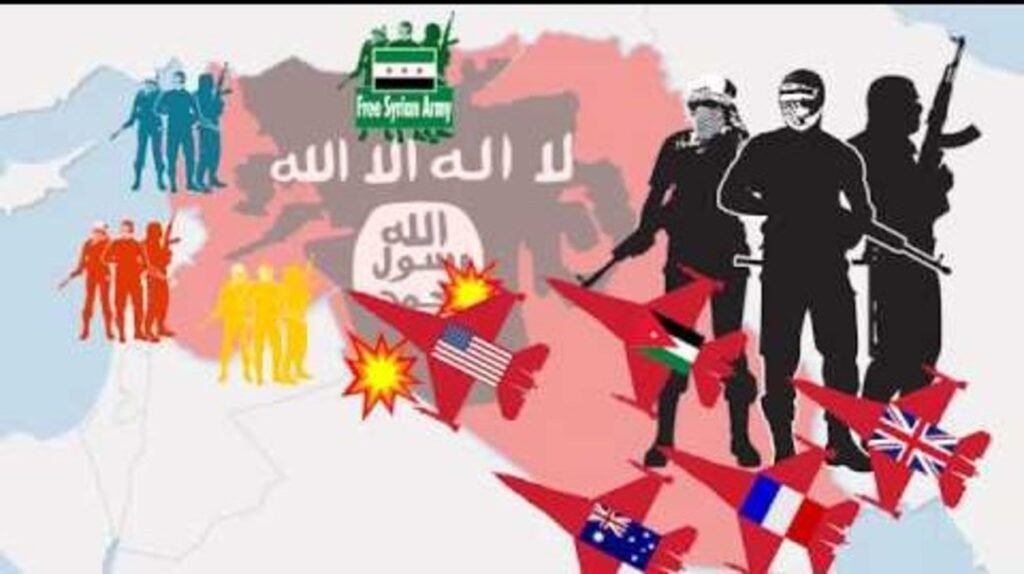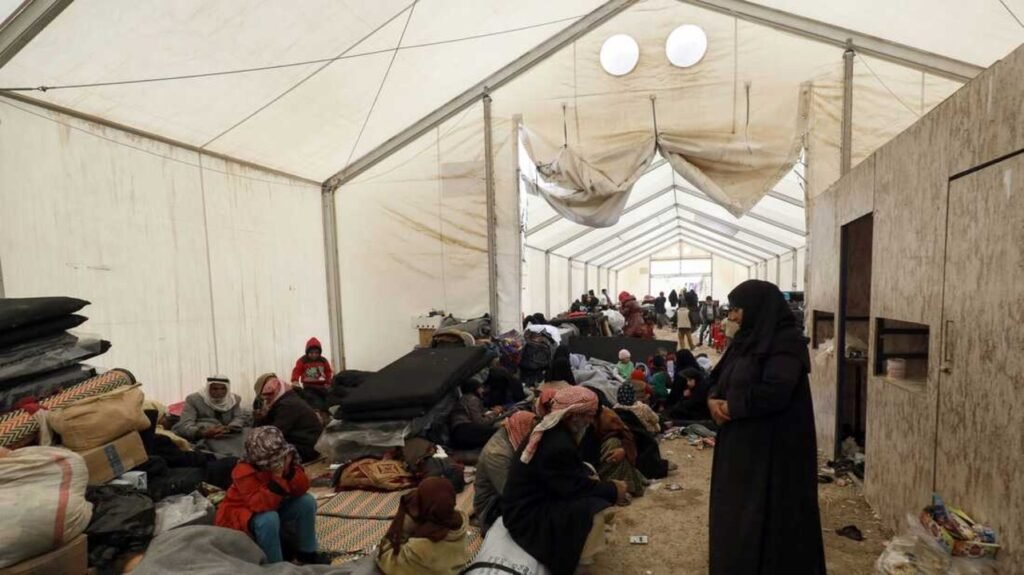Syria Civil War: Over 6 lakh people died over 13 years of conflict
One of the worst wars of the twenty-first century has been the Syria Civil War, which started in 2011. It began as a significant part of the Arab Spring revolutions that erupted throughout North Africa and the Middle East.
The Arab Spring revolution resulted in massive protests against the government of Syrian President Bashar al-Assad. This protest movement began peacefully, but it rapidly grew into a full-scale civil war that involved several foreign parties and caused a humanitarian crisis.

Historical Background of Syria Civil War
The worst conflict began when Hafez al-Assad passed away and his son Bashar al-Assad became President of Syria on July 17, 2000.
The people of Syria first viewed him as a potential reformer for their welfare, but his reign soon started to practice dictatorial policies.
Economic Liberalisation
Certain sectors experienced growth as a result of reforms and liberalization policies that President Bashar imposed. But all of these changes also created more inequality among societal classes and particularly helped a small elite class.
Political Suppression
Political freedom remained severely restricted under the regime of President Bashar. His rule suppressed all types of opposition while punishing any anti-government protestor.

Beginning of Civil War in Syria
Massive Syrians were already upset about the lack of political freedom, excessive unemployment, and corruption under the rule of President Bashar before the war even started.
Hence, the people of Syria were already exhausted from the dictatorial regime of Bashar for 11 years. Moreover, the Arab Spring Movement in their neighboring countries against oppressive rulers inspired the pro-democracy protest movement in Syria.
The Arab Spring movement was a series of pro-democracy uprisings and protests that erupted in neighboring countries including Tunisia and Egypt in late 2010. It led to significant political and social changes in the region.
Following this, a major peaceful protest series broke out in the southern city of Syria, Deraa on March 15, 2011. When the Syrian government used deadly force to stop the protests, people all over the country took to the streets and called for President Bashar to resign.

Eventually, the uprising spread, and so the government crackdown against protestors intensified. People who supported anti-government opposition took up guns, first to protect themselves and then to get rid of the police in their areas. Bashar referred to this major uprising as”Foreign-backed terrorism” and vowed to stop it at any cost.
The confrontation between public-Bashar regime got worse very quickly, and the country fell into civil war. A lot of rebel groups formed quickly, and the fight turned into a civil war rather than just a fight between Syrians and Mr. Bashar.

Extremist jihadist groups with their own goals, like the Islamic State (IS) group and al-Qaeda, got involved by sending money, weapons, and soldiers from other countries as the situation got worse. The international community became even more worried about them because they considered them a big threat.
Ethnic group Kurds in Syria have also brought a new angle to the conflict; they demand the right to self-government but aren’t involved in battle with Mr. Bashar al-Assad’s forces.

Death Toll Due to Syria Civil War
The UN Human Rights Office said that the civil war in Syria killed 306,887 civilians, or 1.5% of the total population between March 2011 and March 2021. At least 27,126 of the dead victims were children.
Michelle Bachelet, then-UN Commissioner for Human Rights said:
The deaths were “direct results of war operations.” This did not include the many, but many more civilians who died because they could not get medical care, food, clean water, and other basic human rights.
Michelle Bachelet, Then-UN Commissioner for Human Rights
Recently several war monitors have estimated 580,000 people died as of May 2021 in the Syrian Civil War. This death toll increased to roughly 617,910 as of March 2024.

Role of different countries in Syria Civil War
Russia and Iran have been the main allies to support the regime of Bashar al-Assad. On the other hand, Turkey, Western countries, and several Gulf Arab states have supported the opposition against Bashar.
Russia
Russia launched an air campaign in 2015 to support President Bashar. It has been proved crucial in shifting the balance of power in the government’s favor.
Iran
Iran sends hundreds of troops and billions of dollars to support the Syrian government. It provides arms, training, and funding to thousands of Shia Muslim military men, including Hezbollah, as well as fighters from Iraq, Afghanistan, and Yemen.
Turkey
Turkey supports anti-Bashar groups and has focused on using rebel groups to counterbalance government forces. It has taken control of parts of Syria’s northern border and intervened to prevent government attacks on Idlib.
It keeps suppressing the rebellious group Kurdish YPG militia whom Turkey accuses of having a link to a banned Kurdish rebel group in Turkey.
Saudi Arabia
The Arabian country provides weapons and funds to rebels to undermine Iranian influence. It is currently considering how to re-engage with Syria and President Assad after a decade of no communication.

Western Nations (US, UK, France)
Trio-countries initially armed the “moderate” rebel forces to undermine the government of Bashar and dominate their hold on the country. However, they have now shifted focus to non-lethal support as jihadists become the dominant force as a powerful armed opposition in Syria.
United States
America led a multinational coalition conducting airstrikes and recruiting special forces to support the SDF since 2014. SDF refers to Syrian Democratic Forces, an alliance of Arab and Kurdish armed men.
It aims to reclaim areas from IS militants and prevent their expansion in the region.
Israel
Israel conducts airstrikes mainly to disrupt Iran’s military presence and the transfer of weapons to Hezbollah and other Shia forces in Syria.
Aftermath of Syria Civil War
- Displacement: Over half of Syria’s pre-war population (22 million) have fled their homes. About 6.8 million Syrians are internally displaced and over 2 million of them are living in tented camps without life essentials. Another 6 million are refugees living in Lebanon, Jordan, and Turkey.
- Humanitarian Crisis: 15.3 million people inside Syria need humanitarian assistance as of early 2023. 12 million of them are at risk of great food unavailability.

- Healthcare: Only half of the hospitals are fully functional. There have been 601 attacks on at least 400 medical facilities. Around 942 medical personnel were killed in the deadliest civil war conflicts in Syria.
- Destruction: Over 35,000 structures in Aleppo were damaged or destroyed before the Syrian government recaptured it in late 2016.
- Cultural Loss: All six UNESCO World Heritage sites in Syria have been significantly damaged, including the deliberate destruction of Palmyra by IS militants.
According to the UN Committee of Inquiry, parties in conflict have carried out almost all crimes against humanity and war crimes. It includes chemical and aerial strikes, attacks that result in intentional starvation, and harsh limitations on humanitarian aid.
Who has a hold on Syria now?
The government of Syria under the command of President Bashar has now regained control of the largest cities in Syria, including Damascus, Aleppo, and Hama.
However, jihadists, rebels, and Kurdish-led SDF have also a stronghold on a significant part of the country. There have not been any changes in terms of power-holding areas in the last three years.
The anti-government rebels remaining base is located in the northwest province of Idlib. It borders parts of the provinces of northern Hama and western Aleppo.
Although mainstream rebel organizations including Hayat Tahrir al-Sham (HTS) supported by Turkey are the dominant jihadist alliance in this area.
There are an estimated 2.9 million displaced persons living here. Many of them are in poor living conditions in camps, including one million children.

Will the Syrian Civil War ever end?
Honestly, it does not look like it will end anytime soon, but a ray of hope is everyone agrees a political solution is needed for the civil war in Syria. There have been several progresses in this regard:
The UN Security Council supports the 2012 Geneva Communique, an official document that provides a plan for ending the violence and achieving a political leadership change based on mutual consent in Syria.
UN Permanent Security Council member countries, the Arab League, the European Union, and other international countries participated in the Geneva Communique.
Nine rounds of UN-mediated peace talks have failed due to President Bashar al-Assad’s refusal to negotiate with opposition groups demanding his resignation.

Afterward, Russia, Iran, and Turkey initiated political talks in 2017 to resolve the civil war conflict in Syria. They reached an agreement in 2018 to form a 150-member committee to draft a new constitution and hold UN-supervised elections. However, there has been little progress despite eight rounds of talks.
As the civil war entered its 13th year, Geir Pedersen, the UN’s special envoy for Syria said:
The situation in Syria was intolerable and that things could not keep going the way they were.
Geir Pedersen, United Nations Special Enovy for SyriaHowever, he also expressed optimism last year that the terrible 2023 earthquake could be a “turning point” for parties involved in war to allow humanitarian actions even if it could be for temporary time.
Apart from his hope, we witnessed the same chaotic ongoing war conflict despite fatal earthquake which killed 50,000 people.
We hope one day innocent civilains of Syria find a moment to take a sigh of relief and peace while getting basic human rights!
Share this content:




Post Comment